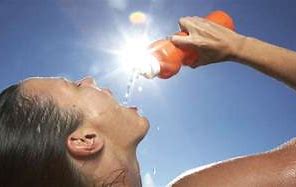Dehydration is a condition that occurs when the body loses more fluids than it takes in. It can happen to anyone, but it is particularly important to be aware of the causes, symptoms, and prevention of dehydration to ensure our overall well-being. In this article, we will delve into the topic of dehydration, exploring its causes, recognizing its symptoms, and understanding how to prevent it effectively.
Table of Contents
- Introduction: The Importance of Hydration
- Understanding Dehydration: A Brief Overview
- Causes of Dehydration
- Inadequate Fluid Intake
- Excessive Sweating
- Diarrhea and Vomiting
- Fever and Illness
- Recognizing the Symptoms of Dehydration
- Increased Thirst and Dry Mouth
- Dark-Colored Urine and Decreased Urination
- Fatigue and Weakness
- Dizziness and Lightheadedness
- Dry Skin and Dry Mouth
- Headaches and Muscle Cramps
- Prevention and Treatment of Dehydration
- Hydrate Regularly Throughout the Day
- Monitor Fluid Intake During Exercise
- Stay Hydrated in Hot Weather
- Pay Attention to Illnesses and Medications
- Rehydrate with Electrolyte Solutions
- Conclusion
- Frequently Asked Questions (FAQs)
- How much water should I drink each day to prevent dehydration?
- Are there certain groups of people who are more prone to dehydration?
- Can drinking other fluids besides water help prevent dehydration?
- Is it possible to overhydrate?
- What are the long-term effects of chronic dehydration?
1. Introduction: The Importance of Hydration
Hydration is crucial for our bodies to function optimally. Water plays a vital role in maintaining our body temperature, cushioning our joints, protecting our organs, and transporting nutrients throughout our system. Understanding the importance of hydration and being mindful of dehydration is essential for maintaining good health.
2. Understanding Dehydration: A Brief Overview
Dehydration occurs when the body loses more fluids than it takes in. This imbalance disrupts the normal functioning of our bodies and can lead to various health issues. Dehydration can range from mild to severe, and recognizing its causes and symptoms is key to preventing and addressing it effectively.
3. Causes of Dehydration
Inadequate Fluid Intake
One of the primary causes of dehydration is simply not drinking enough fluids. When we fail to replenish our bodies with the necessary amount of water, either due to lack of access, forgetfulness, or disinterest, we put ourselves at risk of dehydration.
Excessive Sweating
Engaging in activities that cause excessive sweating, such as intense exercise, working in hot environments, or spending time in high temperatures, can lead to dehydration. When we sweat, our bodies lose water, and if we don’t replenish it, dehydration can occur.
Diarrhea and Vomiting
Diarrhea and vomiting can rapidly deplete our bodies of fluids, leading to dehydration. These conditions cause excessive fluid loss, making it crucial to replace the lost fluids promptly.
Fever and Illness
Fever and certain illnesses can increase the body’s fluid requirements and result in dehydration. When we are sick, our bodies may lose more fluids due to fever, increased respiratory rate, or other symptoms. It is important to maintain hydration levels during illness to support recovery.
4. Recognizing the Symptoms of Dehydration
Recognizing the symptoms of dehydration is essential for timely intervention. Some common signs of dehydration include:
Increased Thirst and Dry Mouth
Feeling excessively thirsty and having a dry or sticky mouth are early signs of dehydration. These sensations indicate that your body is in need of fluids.
Dark-Colored Urine and Decreased Urination
Another symptom of dehydration is having dark-colored urine and a reduced frequency of urination. When dehydrated, the urine becomes more concentrated, indicating a lack of sufficient fluids in the body.
Fatigue and Weakness
Dehydration can cause feelings of fatigue and weakness. Without proper hydration, our bodies cannot function optimally, leading to decreased energy levels and a general sense of tiredness.
Dizziness and Lightheadedness
Feeling dizzy or lightheaded can be a sign of dehydration. When the body lacks fluids, blood pressure can drop, affecting the supply of oxygen and nutrients to the brain.
Dry Skin and Dry Mouth
Dehydration can result in dry skin and a dry mouth. Inadequate hydration affects the body’s ability to maintain moisture, leading to dryness in these areas.
Headaches and Muscle Cramps
Dehydration can contribute to headaches and muscle cramps. Lack of fluids can impact blood flow and electrolyte balance, leading to these discomforts.
5. Prevention and Treatment of Dehydration
Hydrate Regularly Throughout the Day
To prevent dehydration, it is important to drink fluids regularly throughout the day. Aim for an adequate intake of water, and consider including hydrating foods and beverages in your diet.
Monitor Fluid Intake During Exercise
When engaging in physical activities, particularly those that cause sweating, it is crucial to monitor fluid intake. Drink water before, during, and after exercise to replenish the fluids lost through sweating.
Stay Hydrated in Hot Weather
In hot weather, the risk of dehydration increases. Be proactive about staying hydrated by drinking water frequently, seeking shade when possible, and wearing appropriate clothing to minimize fluid loss.
Pay Attention to Illnesses and Medications
During illness or when taking medications that increase fluid loss, pay extra attention to hydration. Consult with healthcare professionals about maintaining proper fluid balance while managing your health conditions.
Rehydrate with Electrolyte Solutions
In cases of moderate to severe dehydration, oral rehydration solutions containing electrolytes can be beneficial. These solutions help replenish not only fluids but also essential electrolytes lost during dehydration.
6. Conclusion
Dehydration is a condition that can have serious consequences for our health. By understanding its causes, recognizing its symptoms, and taking preventative measures, we can safeguard ourselves against dehydration and maintain optimal hydration levels for overall well-being.
Frequently Asked Questions (FAQs)
- How much water should I drink each day to prevent dehydration? The general recommendation is to drink at least eight glasses of water per day. However, individual water needs can vary based on factors such as age, sex, activity level, and environmental conditions.
- Are there certain groups of people who are more prone to dehydration? Yes, certain groups, such as older adults, athletes, individuals with certain medical conditions, and those working in hot environments, may be more prone to dehydration. They should be especially vigilant about staying hydrated.
- Can drinking other fluids besides water help prevent dehydration? Yes, other fluids like herbal teas, diluted fruit juices, and electrolyte-rich beverages can contribute to hydration. However, water remains the best choice for maintaining proper hydration.
- Is it possible to overhydrate? While rare, overhydration can occur when excessive amounts of fluids are consumed without proper electrolyte balance. It is important to maintain a balanced approach to hydration.
- What are the long-term effects of chronic dehydration? Chronic dehydration can lead to various health issues, including kidney problems, urinary tract infections, constipation, and even an increased risk of certain chronic diseases. Proper hydration is essential for maintaining long-term health.






